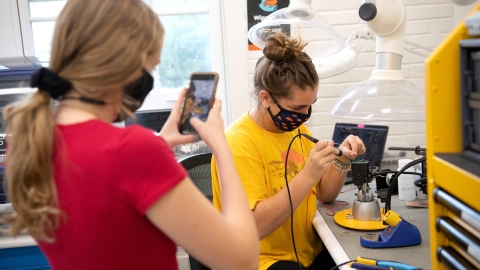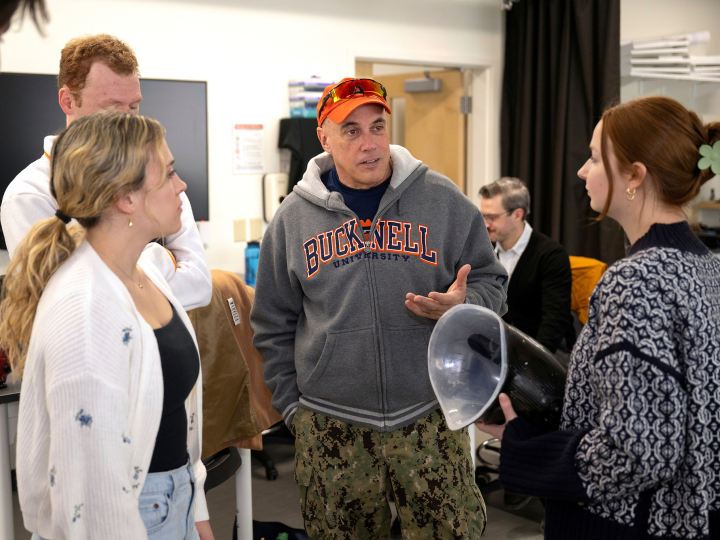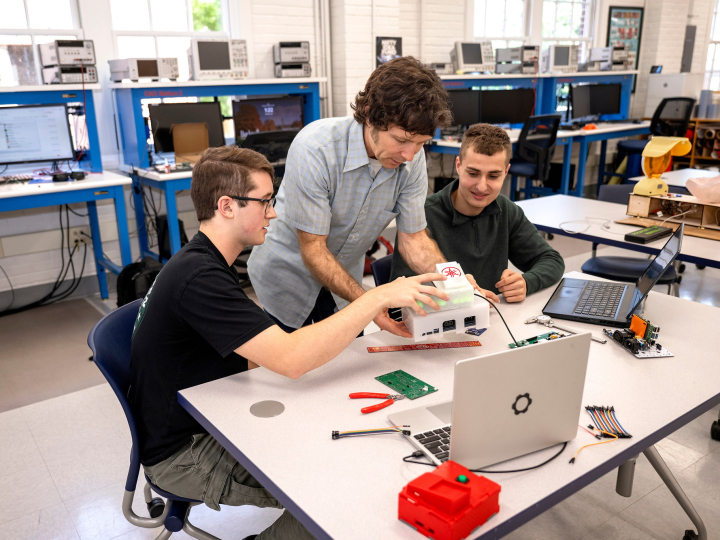
‘The Future Success of Humanity’: $2 Million NSF Grant to Make Bucknell Department a Model for Engineering Education Centered on Societal Challenges
October 5, 2020
Computer engineering majors Rachel Cherrey '22 (left) and Daniela Bellini '22 build circuit boards inside the Maker-E, Bucknell's electrical & computer engineering makerspace. Photo by Emily Paine, Communications
The best engineers in the world won't stop climate change, ensure everyone has access to clean water or prevent the next pandemic — at least not alone.
The National Science Foundation (NSF) recognizes that problems like these are too big for any one discipline to fully address, and is now looking to Bucknell, where top-tier engineering and liberal arts programs coalesce, as a model for nurturing a new generation of broadly trained and aware engineers ready to meet these and other global challenges head on.
In September, NSF awarded a grant of nearly $2 million from its Revolutionizing Engineering Departments program to Professor Alan Cheville, the T. Jefferson Miers Chair in Electrical Engineering, and four co-researchers from the Department of Electrical & Computer Engineering: Professors Robert Nickel, Stu Thompson, Stewart Thomas and Rebecca Thomas. Over the next five years, the Bucknell faculty will seek innovative ways to incorporate these problems and the interdisciplinary approach they demand into the department's curriculum. They'll also uncover methods to help students draw stronger connections between engineering and their other courses, and offer faculty more time to craft and execute high-impact learning experiences.
The end goal, the researchers say, is to create a model that schools around the world can adapt to make their own engineering instruction more effective. It's a tall task, says Stewart Thomas, but a critically important one.
"You can go pretty far and say that the future success of humanity is dependent upon us as engineers thinking in these ways — not just thinking of the technical aspects alone and nothing else," he says.
The Next Level
It's also one the department is well prepared for. The project will build on a reimagining of Bucknell's electrical & computer engineering curriculum that took effect four years ago, one aiming to offer students as many hands-on, real-world experiences as possible, as early as possible.
"We're thinking about what we can do to take that to the next level," says Cheville, the grant's principal investigator. "The idea is to prepare our students to address what the NSF calls 'convergent problems.' These are not interdisciplinary problems in the sense that you need electrical and mechanical engineers to solve them. These are global problems where not only engineers but scientists, social scientists and people on the ground with deep cultural knowledge are going to have to work together."
Approaching these grand and thorny challenges means students and faculty alike will need to forge deep connections with those outside their fields. In fact, one of the project's main contributors won't be an engineer but a postdoctoral fellow with a background in anthropology, ethnography or a similar social science — one of two research fellows the grant will support.
"The ethnography side is to capture the changes in the culture of the department," Cheville explains, "to understand the human element when we try things that don't work, why some people might push back or resist change. Our charge is to revolutionize and transform education. That is innately political in that you have to navigate people's beliefs and have a process that's inclusive."
The grant will enable faculty across the department to purchase supplies for introducing projects that address convergent problems in their courses, and create opportunities for students to bring what they've learned in other classes into their engineering classrooms and labs. Allowing electrical & computer engineering majors to take more classes outside the College of Engineering was also a significant focus of the department's 2016 curriculum changes.
"We want students to pull from the experiences they're having in their courses across campus," Thompson says. "How can we get them to bring in more ideas not just from other STEM courses but from the humanities and social sciences — and also also their own life experiences?"
The Well-rounded Portfolio
One answer is to very directly and intentionally bring those experiences together. The researchers hope to accomplish that by introducing digital portfolios to the department's two majors, where students will incorporate projects from across their classes at Bucknell, helping them draw connections between seemingly disparate fields and ideally to approach the same problems from a multitude of angles.
"It can give students a chance to reflect on all of their experiences and how they've impacted them as an engineer," says Rebecca Thomas, who is leading the portfolio development effort. "So it gives them a broader perspective of their engineering identity and what it means for them to be an engineer — that everything is not technical and we don't all have to fit a stereotyped mold."
The researchers also hope to establish "communities of transformation," where faculty from departments across the University will collaborate to create more integrative curricula. Within the department, they plan to emphasize diverse perspectives and experiences where the rubber meets the road — in grading and evaluating student performance.
"We're trying to align the things we value with what we actually evaluate, and grades are the 'coin of the realm', " says Stewart Thomas. "When we say we value things like good communication, teamwork and the ability to apply your professional skills to many different kinds of problems, then every homework assignment, every exam and every project we do should incorporate those things, and we should evaluate students on them along with more technical, hard engineering aspects."
Bucknell undergraduates won't just experience these changes in their classrooms and labs — many will also actively take part in the research. Funds from the grant will support hiring as many as 10 Bucknell students to assist the project as summer researchers in each of the next five years.
The Most Precious Resource
The grant will also seek to give faculty time back by investing in artificial intelligence and automation for more mundane, course-management aspects of teaching — allowing them to spend more time developing transformative learning experiences in their classes and overseeing student research projects. The second postdoctoral fellow the grant will support will likely be a computer programmer to assist this effort.
Nickel, who's spearheading the technological side of the project, notes that the ed-tech sector has exploded in recent years, a trend the pandemic move toward distance learning has only heightened.
"There's a huge amount of work being done to offer new services and platforms in the educational space. In 2017 about $10 billion was invested in these educational startups. In 2019 it was $19 billion," he says. "The schools that stay on top of this and take advantage are the ones who will see benefits and stay ahead of the pack."
The researchers are quick to observe that these innovations won't detract from the technical aspects of the department's majors. But they also note that the department aims to do more than train "line engineers," but imbue students with skills that will help them rise quickly to leadership roles within organizations, making skills like communication, teamwork and empathy all the more critical.
"There's some good research suggesting that in programs that stay really focused on the technical skills that are make-or-break for an engineer, students actually end up having less concern about other people, less empathy when they graduate than they did when they entered the program," Cheville says.
For a society confronting challenges on a scale seldom seen before, the importance of understanding and empathy can't be understated.
The future, in fact, may depend on it.

